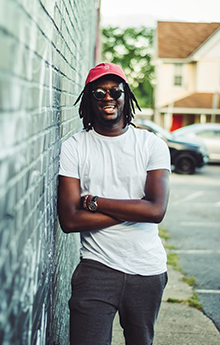
Sharif Ceesay, recently hired on as START’s Program Coordinator, previously held a position as a finance associate for the Department of Geographical Sciences at the University of Maryland (UMD), and earned his B.A in Economics from UMD in 2018.
Ceesay initially applied for the Program Coordinator position after hearing about START from a former coworker at the UMD Behavioral and Social Sciences (BSOS) Dean’s Office, who said it was the perfect fit for his experience on grant management. The job description and START’s aims were a massive draw for him, and after going through the website, he decided he wanted to be a part of the team to see what he could contribute.
What do you do at START?
I am a Program Coordinator here at START. I primarily assist with the pre-award side of grant management. My day-to-day generally involves working with various researchers at START regarding their budgetary needs, communicating with proposal stakeholders on their proposed participation, making sure sponsor stipulations are met, and coordinating with the business office on various inputs involved in routing a proposal.
Where did you grow up?
Most of my childhood was spent in The Gambia, a country located on the west coast of Africa. The Gambia is the smallest country in mainland Africa, and is mostly known for its beaches and island-like atmosphere. The temperature is always between 90-97 degrees Fahrenheit, and you can always find some event going on. It can be somewhat likened to living in a small town, as I went to the same school from Kindergarten up until graduation from high school with the same childhood friends. To further add to my point of the small community feel of The Gambia, a drive that takes more than 15 minutes can be equated to an hour-long drive here.
I also spent a good amount of my teenage years in Leeds, in the United Kingdom, where the best way to describe the city is the endless gray skies that govern the area. However, it is still one of my favorite places to visit today.
How did your childhood shape you and your professional endeavors?
The best way to describe the lessons from childhood that influenced my goals is the determination to provide a service that has a positive impact and helps generate community development. My family is generally made up of various individuals who represent The Gambia and other African countries in the International Affairs field or promote development from within. So within the family circle, you will find ambassadors, development and infrastructure policy experts for development banks, owners of multinational remittance agencies, and hoteliers. Most of their measurements for individual success are tied around community success. It is instilled in my head that whatever I do I have to ensure that it can provide a multiplier effect that greatly benefits lower income communities.
How did your family react when you told them you wanted to make the U.S. your home?
They were not opposed to it. They tend to let the kids do as they choose, as long as they feel that it’s a good path. I will say that they take every opportunity they have to suggest that I should look into going home at some point in my thirties.
Other than being away from your family, what was the hardest part about assimilating in the U.S.?
I cannot say that assimilating has been too hard for me. I will say that I do miss spending time with friends, but WhatsApp and FaceTime help to an extent. Living in the D.C. area helps a ton, as it is such a culture rich international city with a host of activities every day. There is a good Gambian and Senegalese population here, so I can easily get my fixing whenever I crave a good home dish.
What are your plans for the future?
I always find this question a bit hard to answer. The truth is I am not entirely sure yet, but I would like to believe that whatever it is, it will involve boosting the economic and education prospects of low -income communities.
Outside of your work, what do you do for fun?
I spend a chunk of my free time at the gym or playing basketball. I love to run outdoors when I’m able to. It’s an activity I get really competitive in, so I challenge anyone to download the Nike Run Club app and try to beat my distance and pace records!
